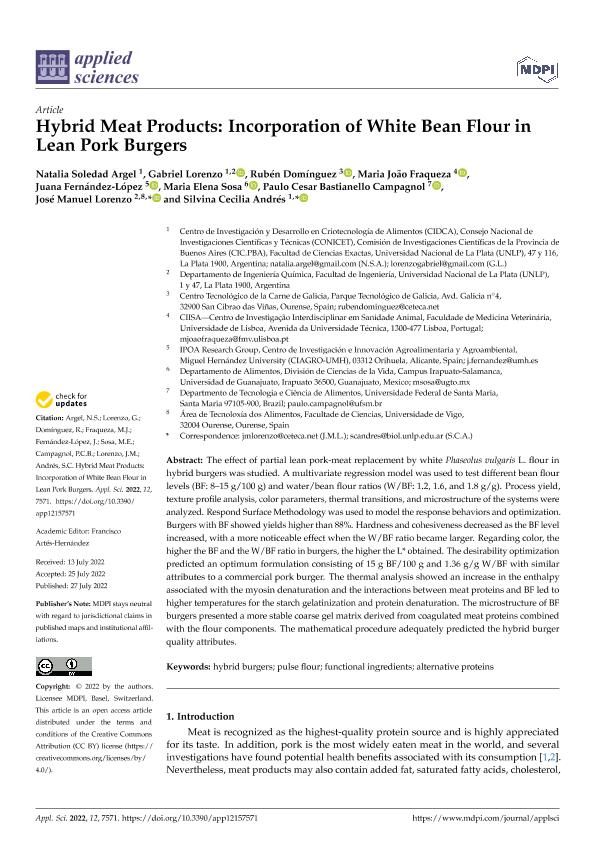Artículo
Hybrid Meat Products: Incorporation of White Bean Flour in Lean Pork Burgers
Argel, Natalia Soledad ; Lorenzo, Gabriel
; Lorenzo, Gabriel ; Domínguez, Rubén; Fraqueza, Maria João; Fernández López, Juana; Sosa, Maria Elena; Campagnol, Paulo Cesar Bastianello; Lorenzo, José Manuel; Andres, Silvina Cecilia
; Domínguez, Rubén; Fraqueza, Maria João; Fernández López, Juana; Sosa, Maria Elena; Campagnol, Paulo Cesar Bastianello; Lorenzo, José Manuel; Andres, Silvina Cecilia
 ; Lorenzo, Gabriel
; Lorenzo, Gabriel ; Domínguez, Rubén; Fraqueza, Maria João; Fernández López, Juana; Sosa, Maria Elena; Campagnol, Paulo Cesar Bastianello; Lorenzo, José Manuel; Andres, Silvina Cecilia
; Domínguez, Rubén; Fraqueza, Maria João; Fernández López, Juana; Sosa, Maria Elena; Campagnol, Paulo Cesar Bastianello; Lorenzo, José Manuel; Andres, Silvina Cecilia
Fecha de publicación:
08/2022
Editorial:
MDPI
Revista:
Applied Sciences
ISSN:
2076-3417
Idioma:
Inglés
Tipo de recurso:
Artículo publicado
Clasificación temática:
Resumen
The effect of partial lean pork-meat replacement by white Phaseolus vulgaris L. flour in hybrid burgers was studied. A multivariate regression model was used to test different bean flour levels (BF: 8–15 g/100 g) and water/bean flour ratios (W/BF: 1.2, 1.6, and 1.8 g/g). Process yield, texture profile analysis, color parameters, thermal transitions, and microstructure of the systems were analyzed. Respond Surface Methodology was used to model the response behaviors and optimization. Burgers with BF showed yields higher than 88%. Hardness and cohesiveness decreased as the BF level increased, with a more noticeable effect when the W/BF ratio became larger. Regarding color, the higher the BF and the W/BF ratio in burgers, the higher the L* obtained. The desirability optimization predicted an optimum formulation consisting of 15 g BF/100 g and 1.36 g/g W/BF with similar attributes to a commercial pork burger. The thermal analysis showed an increase in the enthalpy associated with the myosin denaturation and the interactions between meat proteins and BF led to higher temperatures for the starch gelatinization and protein denaturation. The microstructure of BF burgers presented a more stable coarse gel matrix derived from coagulated meat proteins combined with the flour components. The mathematical procedure adequately predicted the hybrid burger quality attributes.
Palabras clave:
ALTERNATIVE PROTEINS
,
FUNCTIONAL INGREDIENTS
,
HYBRID BURGERS
,
PULSE FLOUR
Archivos asociados
Licencia
Identificadores
Colecciones
Articulos(CIDCA)
Articulos de CENTRO DE INV EN CRIOTECNOLOGIA DE ALIMENTOS (I)
Articulos de CENTRO DE INV EN CRIOTECNOLOGIA DE ALIMENTOS (I)
Citación
Argel, Natalia Soledad; Lorenzo, Gabriel; Domínguez, Rubén; Fraqueza, Maria João; Fernández López, Juana; et al.; Hybrid Meat Products: Incorporation of White Bean Flour in Lean Pork Burgers; MDPI; Applied Sciences; 12; 15; 8-2022; 1-14
Compartir
Altmétricas



